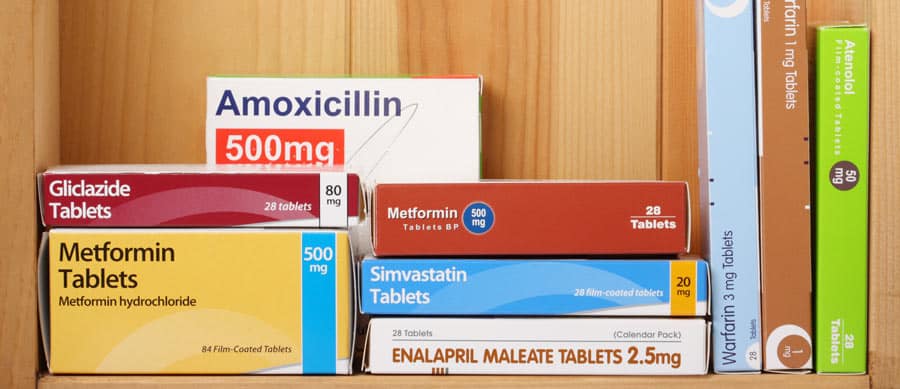Updated August 8th, 2025
Prescription drug abuse is much more common than you might think. In 2023, an estimated 14.4 million Americans misused prescription psychotherapeutic drugs, including 8.6 million who misused prescription painkillers, 4.7 million who misused tranquilizers or sedatives, and 3.9 million who misused stimulants. Approximately 5.3 million individuals aged 12 and older reported having a pain reliever use disorder, while 4.3 million were diagnosed with a central nervous system (CNS) stimulant use disorder. Tranquilizers like Valium and Xanax are also frequently abused, with an estimated 2 million people ages 12 and over misusing them.
Key Takeaways
Prescription drug misuse affects millions of Americans each year, with painkillers, sedatives, and stimulants among the most commonly abused. Warning signs include doctor shopping, forging prescriptions, taking higher doses than prescribed, memory problems, and sudden mood changes. Misuse can quickly lead to dependence and addiction, making early recognition and intervention critical. Medically-assisted detox provides a safe, effective way to manage withdrawal and reduce the risk of relapse.
Table of contents
Although very common, prescription drug abuse is not always clearly recognizable. You may not even realize that you have a problem yourself! If you are taking any medication prescribed to you by a doctor, you should always be aware of the risks as well as the warning signs of dependence and addiction.
Most Commonly Abused Prescription Drugs
Although many different types of prescription drugs have a high potential for abuse, these are the most commonly abused medications, according to the National Institute on Drug Abuse.
- Barbiturates (Amytal, Nembutal, etc.)
- Benzodiazepines (Valium, Xanax, Klonopin, etc.)
- Sleep medications (Ambien, Lunesta, Sonata)
- Codeine
- Morphine
- Methadone
- Fentanyl
- Oxycodone
- Hydrocodone
- Oxymorphone
- Meperidine
- Propoxyphene
- Amphetamines (Adderall)
- Methylphenidate (Ritalin)
These prescription drugs are generally safe when used as prescribed by a doctor, but if abused, they can lead to dependence and addiction. The abuse may be intentional or unintentional, but people typically do it for a number of reasons, including:
- To relieve pain or tension
- To get high
- To prevent withdrawal
- To fit in with peers
- To improve performance at school or work
Warning Signs of Prescription Drug Abuse and Addiction
If you think that a loved one may be abusing prescription drugs or you’re struggling with misuse of your own medication, here are some common warning signs that may signal a problem.
- Getting multiple prescriptions from different doctors (also known as “doctor shopping”)
- “Losing” prescriptions and going back to the doctor for more
- Forging prescriptions
- Stealing prescription drugs from doctor’s offices, pharmacies, or parents’/friends’ medicine cabinets
- Taking higher or more frequent doses than your doctor prescribed
- Appearing to be unusually energetic or lethargic
- Poor coordination
- Experiencing a sense of confusion
- Having frequent memory problems
- Experiencing extreme mood swings
- Being excessively agitated, anxious, or paranoid
Understanding Prescription Drug Abuse: Signs, Risks & Treatment
Which prescription medications are most commonly abused?
Widely misused prescription drugs include opioids like oxycodone, hydrocodone, morphine, fentanyl, and methadone; sedatives and tranquilizers such as benzodiazepines (e.g., Valium, Xanax) and barbiturates; stimulants like Adderall, Ritalin, and Vyvanse; and sleep aids such as Ambien and Lunesta.
What are the warning signs of prescription drug abuse?
Key indicators to watch for include:
- Visiting multiple doctors for prescriptions (doctor shopping), running out of medications too soon, or obtaining forged prescriptions .
- Taking higher doses than prescribed, escalating use, or using drugs via unintended methods (e.g., crushing, snorting) .
- Behavioral changes such as severe mood swings, memory lapses, cognitive difficulties, social withdrawal, declining hygiene, or isolation .
How do dependence and addiction develop?
Prolonged misuse of prescription medications—even when initially prescribed—can lead to physical dependence and addiction. Addiction is characterized by an inability to stop use despite harmful consequences, strong cravings, and compulsive drug-seeking behaviors.
How do doctor shopping and forged prescriptions factor into abuse?
Doctor shopping involves visiting multiple healthcare providers to obtain overlapping prescriptions, while forged prescriptions are falsified documents used to acquire drugs illicitly. Both behaviors signal a deepening dependence and are red flags for serious misuse .
What about memory issues and mood swings?
Long-term misuse of benzodiazepines and other CNS depressants can lead to memory impairment, confusion, mood instability, aggression, and cognitive decline—especially when combined with substances like alcohol or opioids.
Why is medically-assisted detox important?
Medically-assisted detox offers structured support—including medication to ease withdrawal symptoms and medical oversight—to safely break patterns of dependence and addiction. This approach significantly improves outcomes over attempting to quit alone
Prescription Drug Addiction and Detox
If you or a loved one is abusing prescription drugs, it may be dangerous to suddenly just stop taking them and if you do, you may begin to experience very uncomfortable side effects of withdrawal.
Instead, the safest and most effective way to stop abusing prescription drugs is to enroll in a medically-assisted detox program. With medically-assisted drug detox, you’ll work with a team of addiction treatment experts to treat your physical and emotional responses to detox while they use medication to gradually taper you down into a comfortable state of sobriety.
Drug withdrawal can be scary and uncomfortable, but medically-assisted drug detox at Briarwood Detox Center can provide an experience that comfortable, safe, and effective.
Call (512) 363-5914 to learn more about our medically-assisted drug and alcohol detox programs at Briarwood today.
